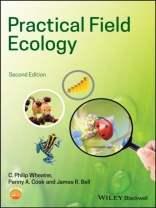Offers a comprehensive, accessible introduction to experimental design, field monitoring skills for plants and animals, data analysis, interpretation and reporting
This user-friendly book presents field monitoring skills for both plants and animals, within the context of a research project. This text provides a single resource to take the reader all the way through from the planning stage, into the field, guiding through sampling, organism identification, computer-based data analysis and interpretation, and finally how to present the results to maximise the impact of the work. Logically structured throughout, and revised extensively in the second edition, the book concentrates on the techniques required to design a field-based ecological survey and shows how to execute an appropriate sampling regime. It evaluates appropriate sampling and analytical methods, identifying potential problems associated with various techniques and how to mitigate these.
The second edition of this popular text has updated reference material and weblinks, increased the number of case studies by 50% to illustrate the use of specific techniques in the field, added over 20% more figures (including 8 colour plates), and made more extensive use of footnotes to provide extra details. Extensions to topics covered in the first edition include additional discussion of: ethical issues; statistical methods (sample size estimation, use of the statistical package R, mixed models); bioindicators, especially for freshwater pollution; seeds, fecundity and population dynamics including static and dynamic life tables; forestry techniques including tree coring and tree mortality calculations; the use of data repositories; writing for a journal and producing poster and oral presentations. In addition, the use of new and emerging technologies has been a particular focus, including mobile apps for environmental monitoring and identification; land cover and GIS; the use of drones including legal frameworks and codes of practice; molecular field techniques including DNA analysis in the field (including e DNA); photo-matching for identifying individuals; camera trapping; modern techniques for detecting and analysing bat echolocation calls; and data storage using the cloud.
Divided into six distinct chapters, Practical Field Ecology, 2nd Edition begins at project inception with a chapter on planning–covering health and safety, along with guidance on how to ensure that the sampling and experimental design is suitable for subsequent statistical analysis. Following a chapter dealing with site characterisation and general aspects of species identification, subsequent chapters describe the techniques used to survey and census particular groups of organisms. The final chapters cover analysing, interpreting and presenting data, and writing up the research.
* Offers a readable and approachable integrated guide devoted to field-based research projects
* Takes students from the planning stage, into the field, and clearly guides them through organism identification in the laboratory and computer-based data analysis, interpretation and data presentation
* Includes a chapter on how to write project reports and present findings in a variety of formats to differing audiences
Aimed at undergraduates taking courses in Ecology, Biology, Geography, and Environmental Science, Practical Field Ecology, 2nd Edition will also benefit postgraduates seeking to support their projects.
关于作者
C. PHILIP WHEATER, PHD, is Professor Emeritus in Environmental and Geographical Sciences at Manchester Metropolitan University. He has published widely in the fields of environmental science, environmental management, biogeography and ecology, including on plants, invertebrates, mammals, and amphibians.
PENNY A. COOK, PHD, is Professor in Public Health at the University of Salford, UK. She teaches statistical analysis, is a Statistical Editor of a peer-reviewed journal, and has published on greenspace, biodiversity and health and well-being, as well as on behavior and evolutionary ecology.
JAMES R. BELL, PHD, is Head of the Rothamsted Insect Survey, Rothamsted Research, UK. He has published widely on insect migration, climate change impacts on insects and the ecology of invertebrates. He has an interest in the analysis of large data sets as well as surveillance and monitoring technologies.












